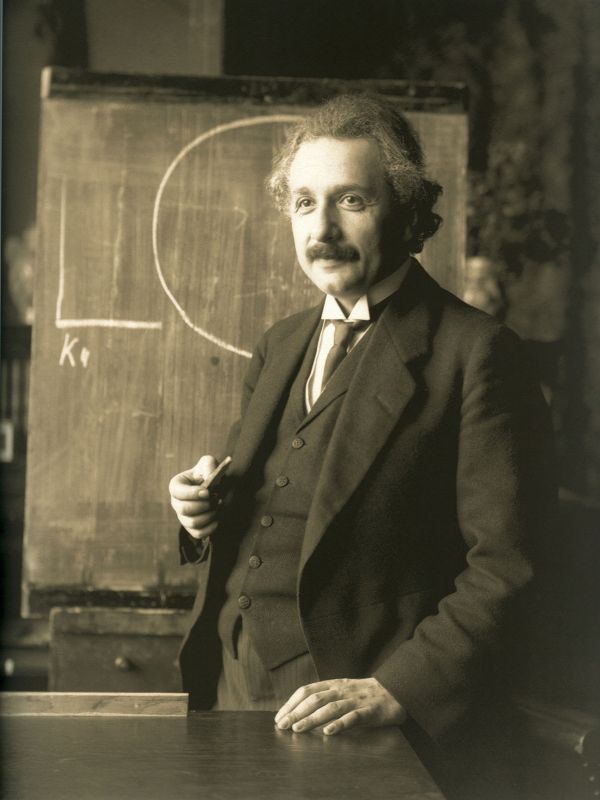We know Einstein as a visionary Physicist, but he was also a passionate humanitarian and anti-war activist. Born a German Jew, Einstein truly considered himself a citizen of the world. His celebrity status enabled him to speak out—on global issues like racism, nuclear disarmament. "My life is a simple thing that would interest no one," he once claimed. But in fact, his letters, notebooks and manuscripts tell a dramatically different story. Einstein saw the Universe as a puzzle, and he delighted in trying to solve its mysteries. All he needed to contemplate the cosmos, was his most valuable scientific tool—his imagination.
Imagination is more important than knowledge. – Albert Einstein

After complete recovery from collapse in 1928, Einstein started making international visits again. Albert Einstein's wife often suggested that he dress more professionally when he headed off to work. "Why should I?" he would invariably argue. "Everyone knows me there." When the time came for Einstein to attend his first major Conference, she begged him to dress up a bit. "Why should I?" said Einstein. "No one knows me there!" What a simple living person he was!!
During his third visit to the United States, he was offered a post at Princeton University. The idea was that Einstein would spend seven months a year in Berlin, five months at Princeton. Einstein accepted the proposal. Einstein came to Princeton University in 1935 and was asked what he would require for his study? He replied: "A desk, some pads and a pencil, and a large wastebasket to hold all of my mistakes."
Anyone who has never made a mistake has never tried anything new. – Albert Einstein
One day a fifteen-year-old girl wrote a letter for help on a homework assignment in mathematics; Einstein sent his reply along with a page full of diagrams to the girl.
"Do not worry about your difficulties in mathematics; I can assure you that mine are much greater."
One day when he a going back home he forgot his home address. The driver of the cab did not recognize him. Einstein asked the driver if he knew Einstein's home. The driver said "Who does not know Einstein's address? Everyone in Princeton knows. Do you want to meet him?" Einstein replied "I am Einstein. I forgot my home address, can you take me there? "The driver reached him home and did not even collect the fare from him.
Einstein was uncomfortable with his fame. He told one biographer, "In the past it never occurred to me that every casual remark of mine would be snatched up and recorded. Otherwise I would have crept further into my shell." But Einstein recognized that his fame made it possible for him to emerge from his shell to argue for the protection of human rights around the world.
By 1949 Einstein was unwell. A spell in hospital helped him recover but he began to prepare for death by drawing up his will in 1950. He left his scientific papers to the Hebrew University in Jerusalem, a University which he had raised funds for on his first visit to the USA. During the final stage of his life, Einstein transitioned to a vegetarian lifestyle, arguing that "the vegetarian manner of living by its purely physical effect on the human temperament would most beneficially influence a lot of mankind".
One more major event was to take place in his life. After the death of the first President of Israel in 1952, the Israeli Government decided to offer the post of second President to Einstein. He refused by saying, “All my life I have dealt with objective matters, hence I lack both the natural aptitude and the experience to deal properly with people and to execute official functions”.
One week before his death Einstein had signed his last letter. It was a letter to Bertrand Russell in which he had agreed that his name should go on a manifesto urging all nations to give up nuclear weapons. It is fitting that one of his last acts was to argue, as he had done all his life, for international peace.
Einstein was cremated at Trenton, New Jersey on 18 April 1955. His ashes were scattered at an undisclosed place.
Many of Einstein's political ideas seemed simple: prevent war through cooperation among nations, treat everyone equally. But he knew that "the problem is to get people to act on these ideas”. He emphasized the need to safeguard civil rights and freedom of expression. Einstein never backed down from his commitment to the principles of freedom and justice. "We have to do the best we can," he had remarked. "This is our sacred responsibility."
His insights fundamentally changed the way we look at the universe and made him the most famous scientist of the 20th century.